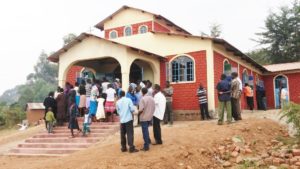III. Our Strategy
The key to developing this urgently needed church-strengthening movement in the BUSA (or anywhere) is to equip churches and church planters to pursue a more biblical pattern of church planting and to not depart until the job is done. This equipping strategy could unfold in three phases:
 A. A logical place to start would be to identify and develop hub churches in each area, churches that can serve as vibrant Antiochs (cf. Acts 11-14) for their area. These sort of ‘grandmother’ churches must understand and own the biblical pattern for church planting. When there is not a strong or potentially strong church in an area, every effort must be made (even if it means a few years of cross-cultural mission) to establish a strong indigenous church there as a hub. There is no substitute for strong churches. No seminaries, no conferences, no associations or coordinators, nothing can replace the biblical role and the long-term impact of a model, Antioch kind of church in each area.
A. A logical place to start would be to identify and develop hub churches in each area, churches that can serve as vibrant Antiochs (cf. Acts 11-14) for their area. These sort of ‘grandmother’ churches must understand and own the biblical pattern for church planting. When there is not a strong or potentially strong church in an area, every effort must be made (even if it means a few years of cross-cultural mission) to establish a strong indigenous church there as a hub. There is no substitute for strong churches. No seminaries, no conferences, no associations or coordinators, nothing can replace the biblical role and the long-term impact of a model, Antioch kind of church in each area.
B. Next, the established, stronger churches must teach and model for the younger mother churches and their church planters the clear biblical pattern for church planting. When we study Acts and Paul’s epistles, we find that the three main stages of effective church planting are laid out for us (Acts 11-14, 15-18):
1. Paul evangelised & gathered new converts.
2. He established them in the faith.
3. He entrusted leadership into the hands of qualified and capable local leadership.
The missiologist Van Rheenen (1996a) confirms this pattern: “Developing a strong movement of God in a new city or ethnic  area requires the accomplishment of three essential missiological tasks. First, initial evangelism must lead to planting new churches. Second, Christians must be nurtured to maturity within these churches. Third, leaders must be [equipped] to evangelize and plant other churches, pastor and shepherd the community of believers, and train other leaders. …While other mission tasks may amplify these three central tasks, a strong movement cannot come into being without their accomplishment.”
area requires the accomplishment of three essential missiological tasks. First, initial evangelism must lead to planting new churches. Second, Christians must be nurtured to maturity within these churches. Third, leaders must be [equipped] to evangelize and plant other churches, pastor and shepherd the community of believers, and train other leaders. …While other mission tasks may amplify these three central tasks, a strong movement cannot come into being without their accomplishment.”
C. Finally, we must help the younger mother churches and the church planters to implement each of these three biblical stages. The leaders of stronger churches must mentor and show these younger churches and leaders, step by step, how to biblically and practically carry out the evangelising-establishing-entrusting process in their own area. For example, in evangelising we must teach them to evangelise more strategically. In our region here, it seems that many of the churches in the black areas have started off on the wrong foot and laid a weak foundation by an evangelism that mostly targets women, youth, and children. I know this is tough because of the migrant worker situation, but in most cases there are still men there. But they must be sought out more intentionally.
 One of our lecturers at Christ Seminary is Andrew Isaiaho from Kenya. Andrew joined us after fifteen years of pastoral and church planting experience in the African context. God used Andrew to effectively plant a healthy church in poor, semi-slum area outside of Nairobi, Kenya. He began in 1994 with a mid-week men’s evangelistic Bible study for the first six months. Only after a core group of men were converted and being discipled were the men urged to invite their families to come along for Sunday services. Now, after years of hard work, Andrew has left behind him a strong church led by a mature group of five biblically qualified elders and a growing flock of over sixty members. While planting this church, Andrew was bi-vocational, carrying another full-time job during the day so that he could provide for his family and not have to burden the young church plant.
One of our lecturers at Christ Seminary is Andrew Isaiaho from Kenya. Andrew joined us after fifteen years of pastoral and church planting experience in the African context. God used Andrew to effectively plant a healthy church in poor, semi-slum area outside of Nairobi, Kenya. He began in 1994 with a mid-week men’s evangelistic Bible study for the first six months. Only after a core group of men were converted and being discipled were the men urged to invite their families to come along for Sunday services. Now, after years of hard work, Andrew has left behind him a strong church led by a mature group of five biblically qualified elders and a growing flock of over sixty members. While planting this church, Andrew was bi-vocational, carrying another full-time job during the day so that he could provide for his family and not have to burden the young church plant.
Conclusion
My earnest prayer and plea is that these three issues – the severe needs, our biblical responsibilities, and the suggested strategies – will drive us to embark on radical church-strengthening movements all across Africa. In my research and discussions with key BUSA leaders over the past few years, this burden continues to weigh on my heart: In order for the gospel to steadily advance through the BUSA (or anywhere in Africa), mother churches must take responsibility for strengthening younger churches until they are well-led, mature, reproducing churches.
Evangelism and church planting must never stop. Expansion and multiplication must never stop. But, if we want it to honour Christ and bring lasting results, it must be married to a church-strengthening movement. Biblically, there should be no divorce: church planting and church strengthening should be one flesh. What God has joined together, let no man separate.
*For the full biblical research and the principles that I gleaned from Acts & Paul’s epistles, see my doctoral thesis entitled, “Building mature churches: a biblical basis and African case study in church planting and church-strengthening.” Please contact me at [email protected] to request a copy
 – Tim Cantrell, President and Professor of Systematic Theology, Shepherds’ Seminary
– Tim Cantrell, President and Professor of Systematic Theology, Shepherds’ Seminary

